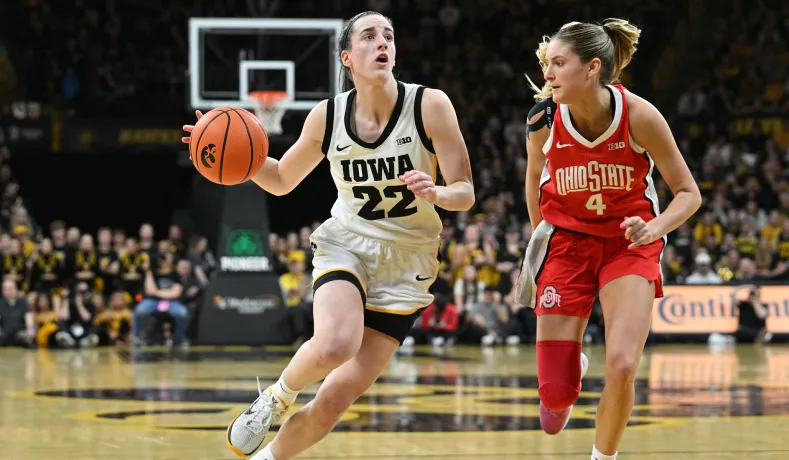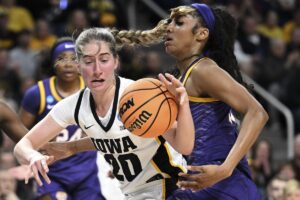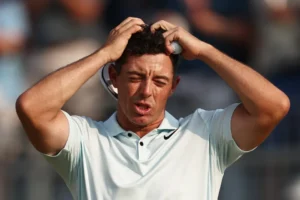
O’Riordan ’27 argues that Caitlin Clark cannot single-handedly revolutionize women’s sports.
Caitlin Clark’s rapid ascent to stardom has captured the attention of even those who typically aren’t interested in sports. The 22-year-old point guard for the University of Iowa gained widespread recognition leading up to the 2023 Women’s NCAA National Championship Game against the LSU Tigers, which saw a doubling of viewership compared to the previous year’s final. Despite the Iowa Hawkeyes’ 102-82 loss, this game marked just the beginning of Clark’s prominence in women’s basketball. In the following 2023-24 season, Clark shattered records left and right, becoming the women’s NCAA Division I scoring leader, setting a major college scoring record, and claiming the record for the most career points of any Division I basketball player, male or female — all within a mere 17 days. The NCAA Women’s Basketball National Championship this year attracted the highest viewership ever recorded for a women’s basketball game and the most for any basketball game at any level since 2019.
While these positive developments should be celebrated within the industry, some prominent women basketball players have expressed a contrasting view. WNBA legend Sheryl Swoopes downplayed Clark’s achievements in a YouTube interview, attributing her record-breaking feats solely to the extra year of eligibility granted to college athletes due to the COVID-19 pandemic. Swoopes portrayed Clark as overpowering much younger players in the league. Similarly, after Clark surpassed Lynette Woodard’s college scoring record, the former University of Kansas star dismissed Clark’s accomplishment, arguing that she had an unfair advantage due to her extended eligibility. It’s worth noting that Clark isn’t even the oldest player on her team and achieved these records in less than four years.
It’s surprising that women, who understand firsthand how frequently their sport gets marginalized, would attempt to undermine the achievements of a fellow athlete, especially one leading the charge for greater representation.
I want to emphasize that Clark isn’t solely responsible for the recent surge in popularity of women’s college basketball. Players like Angel Reese, Paige Bueckers, and JuJu Watkins have also played pivotal roles in a season marked by star power. While women’s college basketball has long enjoyed a large fan base, many believe that this newfound media attention could mark a turning point not only for women’s college basketball but for sports in general.
Clark has emerged as the face of college basketball, but the issue of race cannot be overlooked in this discourse. With over 70% of WNBA players being Black, including Swoopes and Woodard, the influence of media bias in Clark’s rise to fame has been apparent since the 2023 championship game between LSU and Iowa. Clark and Reese, LSU’s standout player and arguably the best forward in the league, engaged in a passionate game, with LSU ultimately emerging victorious. However, the criticism directed at Reese, a Black woman, was far more vicious and less forgiving compared to Clark, who is white. Reese revealed that she received death threats with accompanying racist remarks about her being too “hood” and “ghetto” following the game. It’s ironic that both women faced intense backlash on Twitter for being perceived as overly confident in celebrating their victories, whereas male basketball legend Michael Jordan hurling insults at Muggsy Bogues never raised doubts about his character or greatness.
The lack of support for Black female basketball players is a serious issue in both the NCAA and the WNBA. However, discrediting Clark’s exceptional talent does little to address this issue or highlight the achievements of other women in the sport. On Monday, Clark was drafted to play for the WNBA’s Indiana Fever. The team announced that networks would broadcast 36 out of 40 of their regular-season games, a significant increase compared to the 22 games shown last season. Regardless of the reasons behind the increased publicity, Clark will share the court with nine other women who will undoubtedly receive more attention than ever before. This heightened visibility will enable more WNBA players to expand their fan bases or, at the very least, collectively inspire the next generation of female players to reach new heights.
Unnecessary competition among women for dominance is unfortunately common and often stems from the belief that there are limited opportunities for women in prominent positions. Swoopes and Woodard may understandably fear that Clark’s success will overshadow theirs and relegate them to obscurity. However, the only way to combat and overcome these harmful beliefs is to actively oppose them. While healthy competition drives the sport forward, tearing down women does not.
If the admiration for Clark can continue without certain WNBA legends undermining her accomplishments, then hopefully, more players will have their moment in the spotlight. Women shouldn’t feel compelled to compete for the few spots society deems appropriate for exceptional female athletes. They should be able to thrive in the world of sports without being compared to their male counterparts. Once we begin to appreciate women for who they are, without comparisons, we’ll realize that there are countless players out there waiting to be rightfully acknowledged for their incredible talent.







